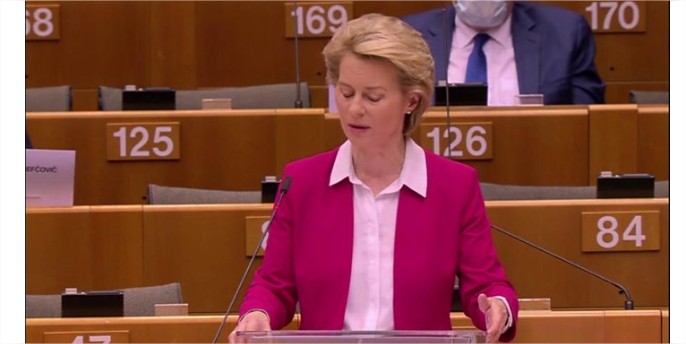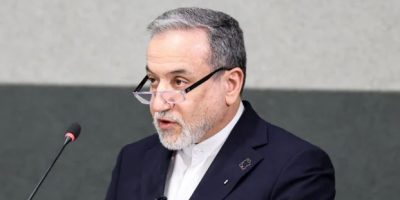Coronavirus: Von der Leyen calls €750bn recovery fund ‘Europe’s moment’

A major recovery fund worth €750bn (£670bn; $825bn) has been proposed by the EU’s executive Commission to help the EU tackle an “unprecedented crisis”.
The package will be made up of grants and loans for every EU member state.
Economies across the 27-nation EU bloc have been ravaged by the Covid-19 pandemic, but several southern states had big debts even before the crisis.
Commission President Ursula von der Leyen said “this is Europe’s moment”.
“Things we take for granted are being questioned. None of that can be fixed by any single country alone,” she told the European Parliament. “This is about all of us and it is way bigger than any of us.”
The Commission has dubbed the plan Next Generation EU. Without the backing of all 27 EU member states, it cannot go ahead. But Germany and France have backed plans for the money to be raised on the capital markets.
Economy Commissioner Paolo Gentiloni said the fund was a “European turning point” that would be added to instruments that had already been launched.
Several “frugal” states object to taking on debt for other countries. Austria, the Netherlands, Denmark and Sweden reject the idea of cash handouts to relatively poorer countries rather than low-interest loans.
What did the Commission president say?
Mrs von der Leyen said the €750bn fund would be made up of €500bn in grants and €250bn in loans. It would be raised by lifting the EU’s resources ceiling to 2% of EU gross national income and would be reliant on the EU’s strong credit rating.
When added to a proposed €1.1 trillion budget for 2021-27, the €750bn recovery fund would bring to €1.85tn the amount that the Commission says will “kick-start our economy and ensure Europe bounces forward”.
When added to an earlier €540bn initial rescue package, that would amount to a total of €2.4tn, said the Commission president.
The EU’s much-cherished four freedoms had to be fully restored, she added, those of freedom of people, goods, services and capital.
She said “this is an urgent and exceptional need for an urgent and exceptional crisis”.
The money raised on the capital markets would be paid back over 30 years between 2028 and 2058, but not later.
The Commission says it could be paid back in several ways:
- A carbon tax based on the Emissions Trading Scheme
- A digital tax
- A tax on non-recycled plasticsCommissioner Maros Sefcovic says recovery has to be based on green and digital policies as well as “increased resilience” and lessons learned from the Covid-19 crisis.
The budget will be “equipped with increased firepower to be able to generate massive investment at the scale and speed needed to kick-start all our economies”, he says.
The European Central Bank has played a key role in helping eurozone countries emerge from the debt crisis with its stimulus programme of bond-buying. But concerns about the ECB programme’s future were raised earlier this month when Germany’s top court ruled that it violated the German constitution.
The UK has left the EU so is unlikely to have any involvement in the fund as it stands.
What do the member states say?
Spain and Italy have seen the highest number of deaths in the EU during the coronavirus crisis and, in the wake of the financial crisis, are particularly keen on grants rather than loans being added to their public debt.
Italian Prime Minister Giuseppe Conte praised the EU for going in the direction that Italy had recommended. “Now let’s speed up the negotiation and make the resources available soon,” he said.
French President Emmanuel Macron hailed it as an “essential day for Europe” adding that it was the Franco-German agreement that had made the recovery fund plan possible.
Spanish Prime Minister Pedro Sanchez was less forthcoming: The plan included “many of our demands” and was “a starting point for negotiations”, he said. Greece said it was a “bold proposal” and it was now up to member states to “rise to the occasion”.
There was a more cautious reaction from some of the so-called “frugal” states. A Dutch diplomat told the BBC it was difficult to imagine the proposal would be the “end state” of the negotiations.
Dutch Prime Minister Mark Rutte summed up the feelings of the wealthier states of Northern Europe on Tuesday. A fund was necessary to stimulate recovery, he said, but “we believe this should consist of loans, without any mutualisation of debts”.
Plans for the long-heralded Green Recovery Fund have been given a partial welcome by environment groups, even though exact details are yet to be revealed.
Campaigners have argued that it is vital for the EU to spend its post Covid-19 stimulus on projects that will also help tackle the climate crisis.
They say the package should drive investment into projects needed to meet Europe’s net zero emissions target.
That includes building renovation, renewables, clean transport, industrial innovation and better land use and food systems.
But there’s annoyance that Brussels has given way to regions by allowing them to spend their funds however they want until 2022 – even if that means investing in schemes which are good for job-creation but bad for the climate.
Related News

Iran foreign minister says progress made in nuclear talks with US
GENEVA: Iran and the United States reached an understanding on the main “guiding principles” inRead More

Ramadan moon sighted in Saudi Arabia, first day of fasting on Feb 18
RIYADH: The Ramadan crescent was sighted in Saudi Arabia on Tuesday evening, which means theRead More


Comments are Closed